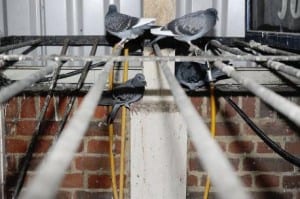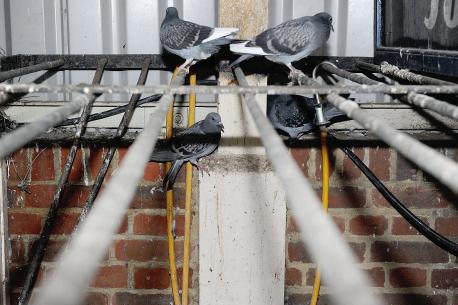Wageningen University released the results of research on a poultry farm that suffered visits from wild waterfowl, which are a source of the avian influenza virus (AIV).
The study revealed that when the laser was in use, a 99.7% wild bird reduction rate was recorded.
Wageningen Bioveterinary Research (WBVR), part of the Wageningen University, previously discovered a mallard, which is a species identified as a high-risk bird for carrying the avian flu virus, was frequenting a free-range area of a poultry farm from sunset to sunrise. This was notable from November to February, the typical bird migration period and when the avian influenza virus is more prevalent. Therefore, chickens in the free-range area had increased exposure to the virus, due to the regular occurrence of wild waterfowl during this time.

The project leader of the study, and epidemiologist at WBVR, Armin Elbers, explained: “Several mallards came to visit the range between sunset and sunrise daily. They look for food and swim in puddles of water that are formed during the winter period by abundant rainfall in the range. While swimming in the puddles, the ducks may defecate. During the day, the chickens drink the same water, as we saw in the video camera images. In the cold winter period, the bird flu virus can survive in such water for a long time.”
Wageningen University & Research did a study with the laser bird deterrent manufactured by Bird Control Group. This study explored whether the laser system could be a successful biosecurity measure to prevent avian influenza viruses from spreading from wild birds to domestic animals. The laser bird deterrent system has been used worldwide in a variety of applications to reduce bird presence. The system spooks birds away by projecting a green laser beam across areas where birds aggregate. The birds see the green laser beam as a solid object and instinctively perceive it as a physical threat, causing them to flee the area immediately.
The WBVR study took place in the winter of 2019-2020. The laser bird deterrent system was deployed on a six-meter-high pole in the farm’s free-range area of 1.5 hectares. In that area, eight wide-angle video cameras were installed to record visits of wild birds. The laser bird deterrent was active in the free-range area between 5 pm, and 10 am when the laying hens were in the barn. Between 10 am and 5 pm, the laying hens were in the free-range area, and the laser was used to protect the grass pastures surrounding the farm. The study was carried out over two months: one month without the laser, followed by one month with the laser.
Elbers earlier discussed the study during the International Egg Commission webinar, “AI Prevention and Innovative Biosecurity Measures — How the Dutch Egg Industry is Tackling AI,” held in October 2020. He said at the time the results would be released soon.
Study results
The results of the study indicated that virtually no wild ducks visited the free-range area (99.7% prevention rate) when the laser was in use. There was also a reduction of visits from other wild birds in the free-range area during sunrise, and 10 a.m. (about 96% prevention). The research interpreted, “The overall (all bird species) efficacy of the laser for reducing the rate of wild birds visiting the free-range study area was 98.2 %.”
When the laser was not in use in the free-range area, a significant number of geese would visit the surrounding grass pastures during the day.
Elbers concluded: “In this study, we confirm the high efficacy of using lasers to reduce the daily number of wild bird visits to the free-range area of a layer farm situated in an AIV-hotspot area. Given this high efficacy, the application of these lasers becomes a viable alternative for the prevention of introduction of avian influenza infections in poultry.”
Industry knowledge and future perspective
“For free-range poultry farms located in high-risk avian flu virus areas, which had repeated introductions of avian flu virus in the past, we believe that a laser could be helpful as a preventive measure to keep wild birds away from the farm during the high-risk period (October to March). Poultry farms with strictly indoor accommodations have also been infected with avian influenza virus in the past due to their location near wetlands. Using a laser during the high-risk period could offer a solution to this problem too by keeping wild waterfowl away from the vicinity of the barn,” Elbers stated.
The laser bird repellent has already been deployed at a poultry farm, Orchard Eggs, in the U.K.
Daniel Hoberichts, the owner of Orchard Eggs, understood the biosecurity measures that had to be taken to protect his poultry. He uses the laser bird repellent to prevent the chickens and staff from being exposed to the avian influenza virus.
Hoberichts explained: “Our birds are housed across 50 acres of orchard and we want to do everything to keep them safe from infection. Once we heard about the AVIX Autonomic it seemed like an ideal solution to complement all of our other biosecurity measures.” The laser bird repellent helped reduce bird presence by more than 90%.
Pigeon Patrol Products & Services is the leading manufacturer and distributor or bird deterrent (control) products in Canada. Pigeon Patrol products have solved pest bird problems in industrial, commercial, and residential settings since 2000, by using safe and humane bird
deterrents with only bird and animal friendly solutions. At Pigeon Patrol, we manufacture and offer a variety of bird deterrents, ranging from Ultra-flex Bird Spikes with UV protection, Bird Netting, 4-S Bird Gel and the best Ultrasonic and audible sound devices on the market today.
Voted Best Canadian wholesaler for Bird Deterrent products ten years in a row.
Contact us at 1 877-4-NO-BIRD,(604) 585-9279 or visit our website at www.pigeonpatrol.ca
Pigeon/Pigeon Patrol / Pigeons Roosing / Vancouver Pigeon Control / Bird Spikes / Bird Control / Bird Deterrent / PIgeon Deterrent / Surrey Pigeon Control / Pest / Seagull deterrent / Vancouver Pigeon Blog / Birds Inside Home / Pigeons in the cities / Ice Pigeons / What to do about pigeons / sparrows, Damage by Sparrows, How to Keep Raccoons Away, Why Are Raccoons Considered Pests / De-fence / Pigeon Nesting / Bird Droppings / Pigeon Dropping / woodpecker control / Professional Bird Control Company / Keep The Birds Away / Birds/rats/seagull/pigeon/woodpecker/dove/sparrow/pidgeon control/pidgeon problem/pidgeon control/flying rats/pigeon problems/ bird netting/bird gel/bird spray/bird nails/bird guard

